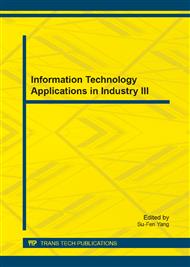[1]
Chen, C.Y., C.J. Chang, and C.H. Lin, On dynamic access control in web 2. 0 and cloud interactive information hub: trends and theories. Journal of Vibration and Control, 2014. 20(4): pp.548-560.
DOI: 10.1177/1077546312463762
Google Scholar
[2]
McNutt, K., Public engagement in the Web 2. 0 era: Social collaborative technologies in a public sector context. Canadian Public Administration-Administration Publique Du Canada, 2014. 57(1): pp.49-70.
DOI: 10.1111/capa.12058
Google Scholar
[3]
Wiewiora, A., et al., Interactions Between Organizational Culture, Trustworthiness, and Mechanisms for Inter-Project Knowledge Sharing. Project Management Journal, 2014. 45(2): pp.48-65.
DOI: 10.1002/pmj.21407
Google Scholar
[4]
Su, A.Y.S., et al., A Web 2. 0-based collaborative annotation system for enhancing knowledge sharing in collaborative learning environments. Computers & Education, 2010. 55(2): pp.752-766.
DOI: 10.1016/j.compedu.2010.03.008
Google Scholar
[5]
Lee, H., E. Reid, and W.G. Kim, Understanding Knowledge Sharing in Online Travel Communities Antecedents and the Moderating Effects of Interaction Modes. Journal of Hospitality & Tourism Research, 2014. 38(2): pp.222-242.
DOI: 10.1177/1096348012451454
Google Scholar
[6]
Paroutis, S. and A. Al Saleh, Determinants of knowledge sharing using Web 2. 0 technologies. Journal of Knowledge Management, 2009. 13(4): pp.52-63.
DOI: 10.1108/13673270910971824
Google Scholar
[7]
Wang, S., R.A. Noe, and Z.M. Wang, Motivating Knowledge Sharing in Knowledge Management Systems A Quasi-Field Experiment. Journal of Management, 2014. 40(4): pp.978-1009.
DOI: 10.1177/0149206311412192
Google Scholar
[8]
Lau, A.S.M., Hospital-Based Nurses' Perceptions of the Adoption of Web 2. 0 Tools for Knowledge Sharing, Learning, Social Interaction and the Production of Collective Intelligence. Journal of Medical Internet Research, 2011. 13(4).
DOI: 10.2196/jmir.1398
Google Scholar
[9]
Xin, J.Y., et al., Analyzing the Use of Web 2. 0 for Brand Awareness and Competitive Advantage: An Empirical Study in the Malaysian Hospitability Industry. Information Systems Management, 2014. 31(2): pp.96-103.
DOI: 10.1080/10580530.2014.890425
Google Scholar
[10]
Allen, J.P., Knowledge-Sharing Successes in Web 2. 0 Communities. Ieee Technology and Society Magazine, 2010. 29(1): pp.58-64.
DOI: 10.1109/mts.2010.935990
Google Scholar
[11]
Newland, B. and L. Byles, Changing academic teaching with Web 2. 0 technologies. Innovations in Education and Teaching International, 2014. 51(3): pp.315-325.
DOI: 10.1080/14703297.2013.796727
Google Scholar
[12]
Shimazu, H. and S. Koike, KM2. 0: Business knowledge sharing in the Web 2. 0 age. Nec Technical Journal, 2007. 2(2): pp.50-54.
Google Scholar


